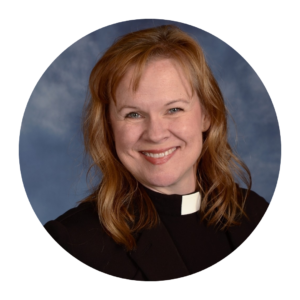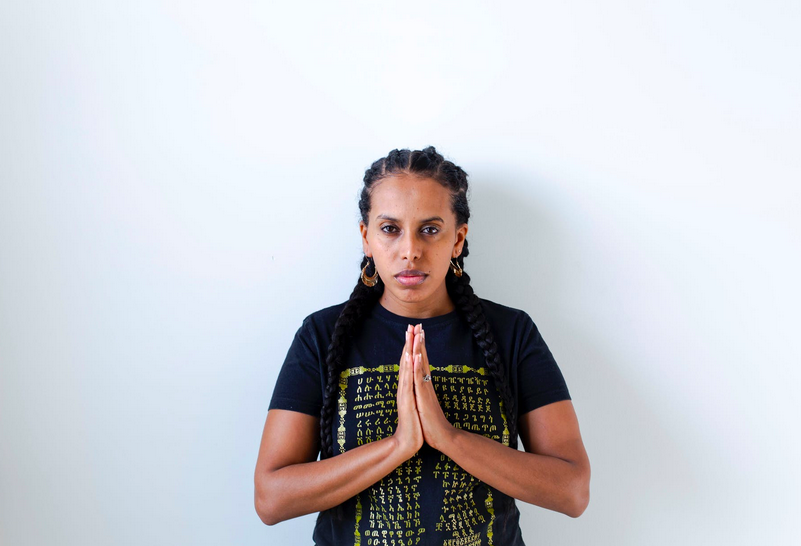The other day, I was driving on a freeway in Los Angeles when I saw a troubling bumper sticker on the back of a car. Using symbols of various world religions, the sticker spelled out the word, “toxic.” Sometimes, these same symbols can be seen spelling out “coexist,” but apparently this driver thought religion did more harm than good. I do not argue religions’ participation in historical grief, abuse, and trauma. Anyone who studies history can clearly see those things happened and happen. And, while I deeply sympathize with any victim of religions’ atrocities, still there is a part of me that wants to point out the other side to things.

Join our Community of Peaceful Living Wellness Warriors
and receive a special free gift:
Our Top 5 Tips for Peaceful Living
I was raised by one of these victims. My mother was shamed and traumatized by a truly toxic version of American Christianity, so I was raised to believe that this was all religion offered. Later as I grew, I discovered a huge range of religious beliefs, practices, and traditions, so much so that I went on to love and teach the religions of the world and now serve as clergy in one of them.
THE SHADOW AND THE LIGHT
In my college teaching days, sometimes my students would ask me to discuss the shadow side of religion.
We would talk about that shadow side: genocides that religions either passively stood by and allowed, or even assisted and supported; holy wars and crusades; the Spanish Inquisition; the European “witch hunts”, genocides against women; unspeakable cruelty toward members of the LGBTQ+ community; racial atrocities; barbarism done in the name of God in order to gain power and control over people, support of terrorism, the squelching of freedom. The list goes on and on.
Eventually though, I would tell my students that I was there not to teach religion-done-badly, but religion-done-well. Just as they would never enter an art appreciation class and explore the “bad” art, or learn in music, literature, or science classes the worst of any of these disciplines.
Just as the students would learn the best of what these disciplines offered, so too I was there to teach them what is good and helpful in the religious world. My purpose is never to convert anyone, or talk anyone into being on a religious path. We all have our own journeys. But my point is to educate. Like politics, medicine, or business, religion can, most certainly, be enacted horribly. It can be abusive, harmful and toxic, and I hope to help heal and change some of these great harms. So too, like any other power, it can be used for good.
FIVE ASPECTS OF HEALTHY SPIRITUALITY
This month and the next, I will point out ten aspects of healthy spirituality (five each month). If you take up a spiritual practice on your own, or if you join a religious group (i.e. a place where spirituality is encouraged and often practiced communally), perhaps these lists might be of service:
LOOK FOR POSITIVITY
The first aspect of healthy spirituality and/or religion is that it feels mostly positive. You know what makes you feel good, and you know what makes you feel bad. If a religious group or spiritual practice feels joyful, peaceful, and relaxing, it is positive. If it strikes you as beautiful or mystical, it is positive. Liken it to how you feel about good art, music or conversation. If you enjoy it, then it is positive.
On the other hand, if a religious group or spiritual practice feels scary, shaming, confusing, depressing, sad, anxiety-producing, frustrating, or consistently difficult you will most likely find it to feel more negative than positive.
I encourage you to trust yourself and the inner guidance of your spirit. It is not good for you to attend a church, synagogue, mosque, or spiritual group where you leave feeling “bad” for whatever reason. That is a sign that something is wrong or off.
If you feel weighed down by burdens of what you “should be” according to the religious group, or if you are made to feel scared of the afterlife, or of divine punishment in this life, this is negativity. If you are encouraged to hate yourself, people, ideas, or things, the group is encouraging negativity. I do not believe that hatred is psychologically or spiritually healthy, and hatred is not of God.
I have left places of various religious rituals feeling “bad.” Sometimes this is a one-time occurrence. Sometimes feeling a little bit negative is actually a challenge to grow. Sometimes that feeling is a call to heal. But, if the negative, or bad, feeling is a common emotion, maybe this place, people, or path is not right for you.
You should typically feel the upliftment of joy, peace, and love in and through your religious or spiritual group or practice!
LOOK FOR GUIDANCE THROUGH LIFE’S CHALLENGES
Your practice should also help you to understand and navigate what you might call “negative” aspects of life. You and I won’t always feel the positive feelings of peace, love, and joy. We will occasionally encounter hard, negative feelings, like loss, anger, sadness, sickness, suffering, death, and grief.
When we are facing struggles from outside of ourselves like Covid, politics, or economic upheavals, our spiritual paths should not tell us to “get over it”, “not talk about it”, or “be ‘good’ spiritual people, who only think happy thoughts.” This is also true when it comes to our internal emotions, like personal grief, anxiety, or stress.
Our spiritual paths will hopefully equip us to face our multifaceted realities. They will give us the tools to tell the truth, embrace our authentic and messy lives, and bravely deal with our challenges in helpful ways. Sometimes we will truly walk through the “valley of the shadow of death” and we need substantial guidance, not cheap and easy answers that won’t serve us.
We need nourishment for those desert times.
Related Post: HOW TO PRACTICE VULNERABILITY: SAFE SPACES & CALM CONFIDENCE
LOOK FOR AFFIRMATION
Another aspect of healthy spirituality and religion, and probably the one I speak of the most, is that it should be affirming. If you are not affirmed as a beloved part of creation, exactly as you are, go find some place that will affirm you.
A spiritual or religious community is like a family. No two people will be alike, everyone has to bend and flow in order to make room for the great diversity of people, but everyone should feel affirmed as a family member with a seat at the table. This does not mean that everyone will do what everyone else does. But we can still affirm who everyone is. We do not have to have all things in common, or share the same interests, but as long as no one is truly abusive or harming others, we can respectfully gather in community.
I cannot tell you how many times a member of the LGBTQ+ community has shared with me how they were not affirmed in a religious group for who they were. A religious group should be a safe haven, a shelter from a cold world, and a place where people can find affirmation and love among compassionate people. We all know what it feels like to be an outsider in a group. No one should feel this way in a spiritual community, or as a result of a spiritual practice. We are each a beloved child of the Divine (the Holy, the Sacred, God).
LOOK FOR COMMUNITY INCLUSIVITY
Related to the above, a spiritual community should be constantly teaching its members to go and give this kind of affirming love away, including to people outside of the spiritual community. The religious community is not just on “Team Religious Community,” but on “Team All of Creation.”
Drawing closer to the Divine, we then naturally draw closer to creation. This applies to all of the major world’s religions. Loving God, and recognizing God also loves, does not draw us from the earth and all in it, but more deeply toward it. So the sermons, meditations, rituals, and practices are not simply for the purpose of us being lifted “up and out”, but “in and toward.”
As an extension of spiritual practices such as prayer, worship, Transcendental Meditation, yoga, and sweat lodges, we should feel naturally called to care for each other. We should leave spiritual practices less judgmental and more accepting, less exclusive and more inclusive, less closed off and more open to the world. Having been filled with love and compassion, it should become ever easier to give away this love and compassion.
LOOK FOR INSPIRATION TO EXPAND
Finally, a healthy spiritual path should be showing us ways to become more expansive. This is because the Divine is speaking to us all at all times, constantly beckoning us more and more along the leading edge of who we are. We never stop growing, but we do not grow our best with the knowledge we each already possess. Rather, we grow best by listening to that voice of higher intelligence calling us to the next thing.
Each day along our spiritual journeys, we should feel encouraged to take the time to hear and follow what we have never been before. This will feel pleasurable to each person, and within that pursuit of pleasure, each one will have tremendous power to affect the world in positive ways. For the baker, learning new ways to create cakes will feel pleasurable and powerful. For the dancer, the pleasure and power will come through dance. For the homeschooler, the pleasure and power will come through homeschooling. For each one, their spiritual and religious practices can encourage them to listen and follow their cutting edge of becoming.
I hope you find this list helpful as you examine your own spiritual and religious practices. Seek after what is healthy for your spirit.
Next month, I will offer up five more aspects of healthy spirituality and religious practices.
Blessings and joy to all!
Pastor Stephanie

STEPHANIE LAPE
Stephanie Lape is a pastor in the Evangelical Lutheran Church in America (ELCA).
She holds a Master of Arts degree in Transpersonal Psychology (the psychology of religious experience) from the Institute of Transpersonal Psychology, and a Master of Divinity degree from Luther Seminary. A long-time professor of comparative religions and former campus minister, she now serves as pastor at Eden Lutheran Church in Riverside, California.
Stephanie speaks and teaches on matters of spiritual and psychological development, biblical studies, the enneagram personality tool, and comparative religions. She is an active advocate for interfaith and ecumenical studies. She has taught classes on major religious movements in churches, schools, and city programs, while also leading tours and guest speaking at mosques, synagogues, and temples. Stephanie is honored to be a speaker at the 2021 and 2023 Parliament of the World’s Religions.
She also loves to write. Stephanie is a contributing author for Living Lutheran Magazine and author of Beckoned: Hearing God’s Call to Deeper Faith, which is both a travelogue of her own winding spiritual journey, as well as a guide to help people discover their own path. She lives with her husband and two children in Southern California.




One Response
Perfect!